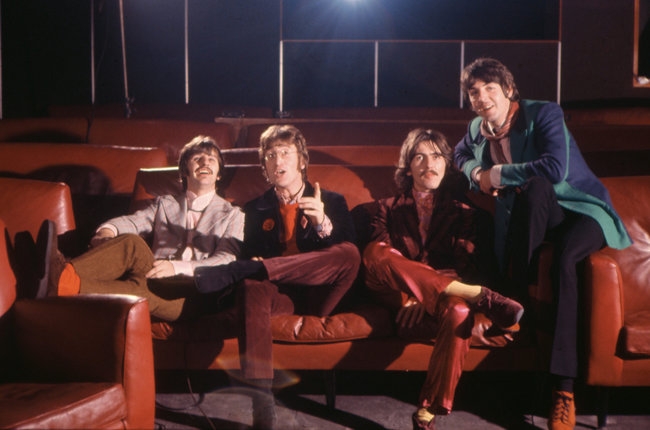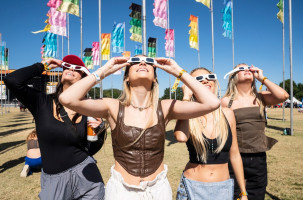On Aug. 15, 1965, The Beatles continued the British Invasion with a sold-out performance at Shea Stadium. In the years since, the concert has become legendary. A movie of the concert was broadcast on ABC in 1967. The concert was then used in the mid-1990s for a documentary series called The Beatles Anthology. And most recently, Ron Howard used footage for his own film, Eight Days a Week — The Touring Years. But who actually owned the tapes?
On Wednesday, a New York federal judge rejected the contention that it was Sid Bernstein's company. A huge promoter in the 1960s who worked with acts such as The Rolling Stones and James Brown, Bernstein is perhaps best known as the guy who brought The Beatles to the United States. He was the one who proposed the idea for the Shea Stadium concert to Beatles' manager Brian Epstein. In 2013, he died at the age of 95.
Around the time that Apple Corps — the company established by Paul McCartney, John Lennon, Ringo Starr and George Harrison — announced the release of Howard's film, those controlling Bernstein's company after the promoter's death submitted an application to register ownership of the copyrights in the "master tapes" of the 1965 concert. One problem: The registration conflicted with a 1988 one from Subafilms, an entity associated with Epstein and The Beatles.
Rejection by the U.S. Copyright Office didn't stop the Sid Bernstein company from then suing Apple Corps and Subafilms last year upon the theatrical debut of Eight Days a Week. The plaintiff asserted ownership and claimed that the ABC movie, The Beatles Anthology, and Howard's film were infringing derivative works.
All that became the fodder for a decision from U.S. District Court judge George Daniels, whose opinion manages to touch upon several hot topics in copyright law while addressing this essential question: Can a concert promoter claiming creative contributions to a performance really be deemed to be an owner, or at least a joint owner, of what was recorded?
First, the judge addresses contracts.
Daniels writes that the agreement between Bernstein and Epstein's company four months before the concert "reserves no rights whatsoever for Bernstein in any filming or recording of the concert," and what's more, a second contract between Epstein's company and Ed Sullivan's for production services expressly provided that Epstein's company "shall be copyright proprietor of the film" with the right "to exploit the Film in any manner, in any media throughout the world in perpetuity."
The judge says the contracts "are plainly consistent with the notion" of ownership by Epstein's company, and that any argument as to raw footage "strains credulity and is totally inconsistent with the conduct of the relevant parties in the decades following."
Second, there's the statute of limitations.
The Copyright Act mandates that lawsuits must be brought within three years after the claim accrued, but Bernstein's heirs pointed to Petrella, meaning the 2014 U.S. Supreme Court opinion regarding a copyright dispute over Martin Scorsese's classic film Raging Bull. There it was ruled that as long as the infringement is ongoing, copyright plaintiffs can sue whenever. A long delay isn't a bar to suit. Plaintiffs, though, can only collect damages for the prior three years of infringement.
Getting to an issue that's frequently popped up in many legal disputes since, Daniels writes, "But Petrella only addressed the timeliness of infringement (as opposed to ownership) claims, as that plaintiff was the undisputed 'sole owner of the copyright' in the work at issue. … Because Bernstein's ownership claim arose, at the latest, by 1991, it was surely time-barred by the time SBP filed suit in 2016. Accordingly, both the ownership and attendant infringement claims must fail."
Daniels could stop there. He doesn't.
Third, the judge addresses points over authorship.
The argument was that this Shea Stadium concert wouldn't have happened if Bernstein hadn't raised money for the performance, rented the venue, hired security, arranged the opening acts, paid The Beatles, got Ed Sullivan involved and so forth.
On the motion to dismiss, though, the defendants pointed to the acknowledgment that once the concert began, Bernstein just "observed" and had no control or input into the filming of the concert.
"By zeroing in on Bernstein's contributions to the filming of the concert rather than his efforts as a producer and promoter of the event, it is obvious that he is not an 'author' of any fixed works," writes the judge.
Fourth comes the ownership question in the guise of a work-for-hire theory.
Because Bernstein was The Beatles' employer for hire, it was argued, copyright contributions made by the band embodied in the master tapes vested to him.
The judge shoots this down as well.
"For largely the same reasons as discussed above, this theory is misguided and fails on multiple grounds," he writes. "The relevant legal question is not the extent to which Bernstein contributed to or financed the 1965 concert; rather, it is the extent to which he 'provided the impetus for' and invested in a copyrightable work — e.g., the concert film. The Complaint and relevant contracts clearly refute any such claim by Bernstein."
And thus, with wisdom also gleaned from everything from JAY-Z's fight with a sound engineer to an actress' challenge over Innocence of Muslims, The Beatles prevail with a little help from attorney friends, Paul LiCalsi and Michael Kolcun.
This article was originally published on The Hollywood Reporter.








